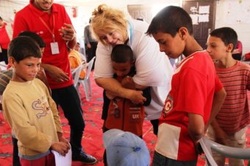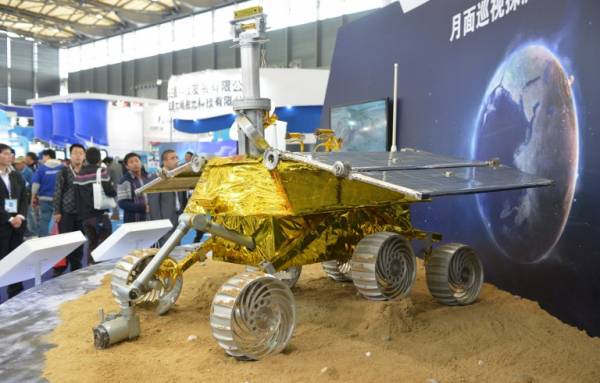prompt: Prompt: Can robots take care of babies in a nursery? How would this affect their development and how would it compare to human interaction?
My response: I believe that because how immenseley our technology has grown and been highly innovative, robots will be designed to perfectly take care of babies. Thus, I believe that robots will definiteley be able to "play" with babies, give them food, water/ milk, clothing. They will be able to put clothes on them and change their diapers. They will be able to clean up babies' messes. They will be able to talk and interact with them.
However, because robots, are machines and not humans, they are unable to feel. Thus, when a baby is crying, it is most likeley that the robot will not know why the baby is crying and how to console it in the best manner. Also, they will probably not have natural instincts, that a mom has to a baby or a caregiver has to a baby when it comes to genuineley understanding what the baby is feeling at certain times. Thus, this causes a huge communication impediment. Thus, robots will not be able to fully communicate with the baby to a full extent because it is restrained by not having any emotions. Also, although it may talk with the baby, the words coming out of its mouth will sound unnatural.
Thus, this will definiteley negativeley affect babies' interactions with other humans because they have been "raised" by this robot. They might speak in a way that doesn't express their emotions or they may speak monotoneley. They might not develop a lot of emotional intellegence because they have been raised by something that lacks emotional intellegence. Also, this may prevent the baby from being able to console other humans or feel their enjoyment because the baby wasn't able to feel anything from the robot.
I learned in my other class that there was this experiment done a long time ago where babies were secluded from the outside world for a while and when they came out of this seclusion, they weren't able to speak. Thus, because the baby would be secluded from the human interactions and world, it will hurt their ability to communicate.
-----Syeda Fareeda Inamdar
Magic Beans
The story of how those golden seeds are so bright,
sprouting into a talking flower seems like magic
certainly sounds like a myth.
Although talking to a flower may seem mythical
imagining the beauty of its colors and the seed's brightness
gives a shimmering feeling that's magical.
The longing one has to experience this magic
to live in this strange world of myths,
to hold, touch, feel, see this experience, something so bright.
Although this story may sound like a myth, there might be something really magical in certain seeds.
-Syeda Fareeda Inamdar
Water Cycle
Looking at the tall, luscious green trees
for they are like this because of water
falling out of clouds from the sky.
Heavy, grey matter created by condensation paints the sky
because it is formed by its purest form of water,
and it's percipitation quenches the thirst of grass, bushes, and the trees.
Oh how many living creatures crave for this water
as it evaporates from the oceans to the skies
oh how brittle is getting that tree.
For it is this process of evaporation, condensation, and precipitation of water that flass from the sky that helps the biology of trees an society.
--Syeda Fareeda Inamdar
 I thought that last week's morsel prompt regarding how living in a warzone can have an effect on a child's emotions and views was very provocative. After doing a bit of searching, I found an article on abc news about children who are refugees from the war in Syria. ( http://www.abc.net.au/news/2013-09-23/program-aids-syrian-refugee-children-haunted-by-horrors-of-war/4966286) As one of UNICEF specialists puts it, "Some of these children have experienced horrors that you and I could never imagine". The story about the boy named Farid was particularly hard for me to grasp -- not only that a child could witness his father and his cousin being shot in the head by a sniper, but also that he would "want to die" afterwards. The idea of a child being so traumatized and feeling so hopeless paints a really horrifying picture, and it really makes me happy that organizations like UNICEF and IBC exist to give these children therapy and support. I honestly can't remember much from my childhood other than playing Pokemon games and watching cartoons, but these kids have been through harrowing experiences that they will remember for the rest of their lives...This article really put things in perspective for me. I guess you never really realize how privileged you are until you see what other people have been through.
-- Mark Craig
Before the school year started, I will honestly say that I wasn't in tuned with my culture and my identity of being a Vietnamese American. This past Thanksgiving break I was telling my parents my interest in taking a Vietnamese language course so I could speak fluently in Vietnamese rather than in broken dialect. My mom's response (in vietnamese) "You shouldn't do that, learning English is hard enough for you, you don't need to". This made me realize something (after of course being offended) that my parents never really exposed me to my culture. I've lived in this, yes, in that we celebrate tet and other cultural festivities, but I was never truly explained and educated on why these festivities and traditions existed. I was also never lectured for not speaking enough Vietnamese or too much english, because that's what my parents wanted. .. But I today, being the adult Vietnamese American daughter today who goes to a prestigious school and took an Asian American studies course. I've become more aware of how ignorant I've been in regards to my own culture. I've been immersed in the American culture and my way of living, but not truly embracing the culture that my parents, grandparents, and ancestors have lived in and embraced for their whole lives. But now I make it my mission to not only try and speak Vietnamese more fluently but also learn and embrace my culture's traditions so that I too can do the same for my kids. So that my language and traditions aren't lost in later generations, because if I don't do it, who will once my parents aren't around for my to ask questions anymore? I thank ASAMST for this realization.
Janice Le
How does growing up in a war environment affect a child's views and emotions?
Growing up in a warfare environment can affect a child in many ways depending on his or her experiences. It's different for the child whose parents are in the war versus the child of a secure, wealthy upper class family who don't have to worry about being ambushed by soldiers are having his or her parents taken away in the middle of the night. War can be emotionally scarring and may lead to intense fear or loss of trust in humanity, at least that's what I believe. After the war, children can be victims of PTSD where they have recurring phases of flashbacks of traumatic events. On the flip side, children may grow up thinking that war is just a part of everyday life or that it is justified. Some children may end up wanting to fight in the war if another family member influences them or they feel a sense of patriotism towards their country/the need to fight. The possibilities are limitless, but in the end, I think that everyone is a victim of warfare. Children lose their parents, their loved ones, a life that could be spent living happily. And for those not directly involved with the war, they may lose sight of morality or fail to recognize that there are less fortunate individuals who are suffering.-Rachel Chung
 The "Jade Rabbit" Picture: AFP PHOTO/Peter PARKS On Monday, December 1, 2013, China will launch its first moon rover mission. The rover, named “Yutu” or “Jade Rabbit,” is set to blast off 1:30 AM from the Xichang Satellite Launch Center in Sichuan province. The name is derived from the ancient Chinese myth about a white rabbit that lives on the moon as the pet of Chang’e, the lunar goddess who consumed an immortality pill. The Chinese believe that their origins are represented by the marks left on the moon’s landscape. For example, the black areas on the moon are where the moon palace, osmanthus trees, and a jade rabbit are found. The “Jade Rabbit” is equipped with several technological breakthroughs, including its autonomous navigation system and wheels that can grip the moon’s powdery surface. It can also climb inclines up to 30 degrees and travel 200 meters per hour. Although China is still straggling behind the US and Soviet Union in the Space Race, China is catching up quickly to its counterparts. By 2020, China hopes to create a permanent space station and eventually send an astronaut to the moon. For more information, please click on the following link http://www.enca.com/technology/china-launch-maiden-moon-mission-Rachel Chung
My friend (he goes to Stanford now... yuck!) plays in a piano festival! I wish I could play this well. 0:
Jordan Wong
Prompt: Can robots take care of babies in a nursery? How would this affect their development and how would it compare to human interaction?
Although it would be really helpful for working parents and release more labors from the task of nursery if robots can take care of babies, it is still not a good idea to let robots replace the in charge humans.
Fist of all, each baby is unique. Therefore, it’s extremely hard to design universal programs of robots, which cover possible responses of all babies. Customized robots, however, will cost much more than hiring a real human to take of the baby.
Second, once designed, robots generally cannot react effectively to unpredicted accidents. There are so many uncertainties on babies’ behaviors and it could be really dangerous if the robots fail to protect babies from potential injuries. Even if the robots are intelligent enough to “learn” new skills and “adapt” to different conditions while interacting, it’s still too risky to let the robot “learn” how to take of the a baby by itself during the process of nursery.
Last but not least, robots, unlike human beings, have no emotions or empathy. When interacting with robots, babies can hardly feel being loved or being cared about. Even if taking care of babies is really time-consuming and painstaking, it is necessary and significant to establish a bond between the parent and the baby and instill a caring personality of the baby by spending time together. Babies raised by robots, however, will lose such bond and vital characteristics. Therefore, they may grow up as indifferent, cruel and inhuman adults, which could be really harmful for both themselves and the whole society.
--Jiaqi Liu
|


 RSS Feed
RSS Feed